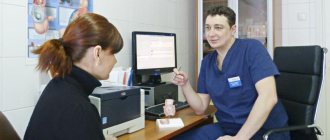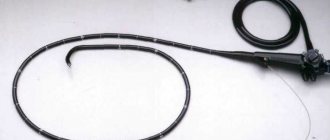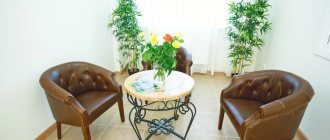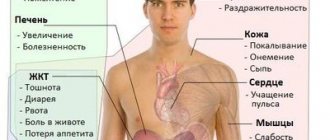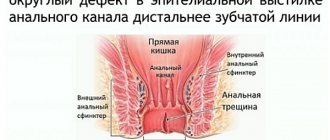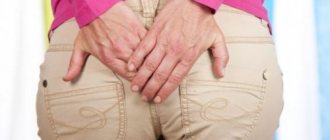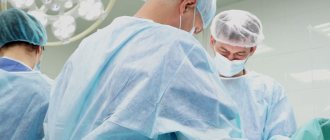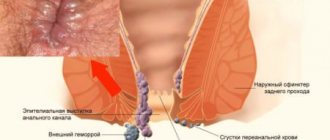How does normal bowel movement occur?
The rectum represents the last structural part of the gastrointestinal tract. Its purpose is to remove feces from the body.
This process is carried out by pushing out the digestive gruel with the muscles of the rectum located inside its folds. The outlet of the rectum, the anal sphincter, is equipped with muscles that reflexively relax during defecation. The mucous layer of the last section of the large intestine is richly supplied with glands that secrete secretions that facilitate the passage of feces through the anus.
The veins of the rectum are located under the mucous membrane and are called hemorrhoidal.
When infectious lesions occur, tumors form, dilation and subsequent inflammation of the rectal veins, the normal process of fecal excretion is disrupted and painful symptoms occur.
Pain in the anus and rectum
Pain in the anus and rectum is characteristic of diseases of the anal canal and perianal area.
The most common cause of pain in the anus is an anal fissure. When a fissure occurs, it usually occurs during or after extremely difficult bowel movements and is localized exactly in the anus. When such pain occurs, it most often has a sharp cutting, “scratching” or “burning” character and can last in the form of dull, spasmodic impulses from several minutes to several hours. This is explained by the concomitant spasm of the internal sphincter.
During exacerbations of hemorrhoids, pain in the anus can be constant, pulling or pulsating, less often - spastic in nature, or manifest itself as varying degrees of discomfort, sensation of a foreign body. As a rule, this is accompanied by an enlargement of the node (nodes, “bump”, “ball”, etc.) in the anus. Very similar symptoms can also occur in a more dangerous condition - acute paraproctitis, but in addition to increasing pain and “swelling” in the anus over several days, there may be signs of intoxication - weakness, fatigue, an increase in body temperature from low-grade to 38-38. 40C.
Pain in the anal area during defecation and at rest, accompanied by the discharge of blood and mucus, may be one of the signs of cancer of the anal canal or lower ampullary intestine with spread to the anal canal.
With cryptitis or papillitis, pain in the anus may not be associated with bowel movement and is usually of a burning, itchy nature.
Localization of dull, nagging, “shooting” pain in the rectum, anus, sacrum or coccyx, with various irradiations, which occurs during defecation, physical activity, changes in body position, or is spontaneously characteristic of coccydynia, anusalgia, proctalgia, presacral cysts, meningocele and others extraintestinal space-occupying formations. If such a pain syndrome is accompanied by impaired bowel movement and the presence of pathological discharge (blood, mucus), sometimes in combination with false urges and symptoms of general intoxication, then one can think about an exacerbation of ulcerative colitis, or a large tumor of the ampullary part of the rectum.
- -Discharge of blood from the anus
- - Diarrhea (“diarrhea”).
- -Stomach ache
- -Discharge of mucus and (or) pus from the anal area
- -Anemia (“anemia”)
- - Intestinal obstruction
- -Constipation
- -Increased gas formation (flatulence)
- - Tenesmus (false urge to defecate)
- -Fecal and gas incontinence
Common causes of pain during bowel movements
The causes of pain that occurs when emptying the rectum can be divided into:
- inflammatory,
- tumor,
- associated with vascular pathologies, injuries.
proctologist can identify the cause of pain during bowel movements.
, based on the results of examination and palpation, conducting hardware and laboratory examinations.
Inflammatory diseases of the rectum:
- Proctitis occurs due to inflammation of the rectal mucosa under the influence of infectious diseases of bacterial or parasitic etiology.
- An anal fissure appears as a result of mechanical trauma to the anus by hard feces. The addition of bacterial flora causes inflammatory reactions that impede healing. May be complicated by paraproctitis.
- Paraproctitis is the formation of an abscess in the tissues surrounding the anus.
- Submucosal abscess occurs rarely, against the background of a general decrease in immune defense. The inflammatory process is localized in the anal area.
Tumor diseases of the rectum: polyps, cancer, are also causes of pain during bowel movements, which are always accompanied by bleeding of varying intensity.
Diseases of the rectal veins are the most common cause of pain during bowel movements. The existence of a hemorrhoidal node often causes minor pain when emptying the rectum. Complications of this pathology: vein thrombosis, their necrosis, inflammation occur with unbearable pain.
Injuries to the perineum and sacral spine may be accompanied by pain during bowel movements.
Some features of the structure and functioning of the rectum
There are many reasons for pain in the anus!
At the exit of the rectum there is a sphincter, which is a muscle sphincter. It is in the form of a ring that covers the anus. When the muscle lining of the rectum tenses, the sphincter opens. In this case, feces are pushed out.
So that they can easily pass this segment, there are folds on the inside. For example, one of them looks like a spiral that makes one and a half turns. Therefore, even the densest fecal lump comes out without problems. After all, he simply unscrews himself from there.
We must remember about hemorrhoids located in the submucosal layer. From these nodes, the outflow of blood does not go to the liver, as in many other cases, but directly to the inferior vena cava (general blood flow). In medicine, this property is used very rationally.
If it is necessary to achieve the fastest possible effect of drugs, they are administered into the rectum in the form of suppositories. They do not enter the liver for a long period of time, but immediately begin to act in the body.
The glands located in the rectum secrete mucus, the thick consistency of which is a reliable protection against various injuries and lesions.
Sometimes painful sensations appear in the anus. They signal inflammation or irritation. Men prefer to hide problems that arise in the anal area. A lot of time is spent on self-medication, which in most cases does not help. Fortunately, most of the violations in this area are not too serious. Therefore, a cure can still be achieved. But first you need to understand the reasons that caused the pain.
Stages of diagnosis of rectal diseases
- A visual examination of the affected area, manual examination of the rectum and anus are performed by a proctologist, using pain relief methods.
- Endoscopic examination: the doctor performs rectoscopy in the absence of contraindications to the procedure.
- Analysis of tissues taken for analysis during rectoscopy (histological, cytological, bacterial culture).
Many private clinics in the capital offer patients a consultation and examination by a specialist by calling a proctologist at home
. At home, the doctor will perform all examinations, including hardware examinations using portable equipment.
Useful information on the topic:
- Pain and blood during bowel movements
- Pain during bowel movements in children
- Diagnosis of pain during defecation
- Treatment of pain in the coccyx
- Treatment of pain during bowel movements
- Pain during defecation
This article is posted for educational purposes only and does not constitute scientific material or professional medical advice.
Author:
Isaeva Nadezhda Anatolyevna
Back to section
Pain during bowel movements
General information
Defecation is the process of the body excreting feces from the digestive tract (in humans, from the rectum) through the anus. Normally, bowel movements occur about once a day (from 1-2 times a day to 1 time in 2 days). Whether bowel movements occur more frequently (frequent bowel movements) or less often (constipation), this is usually accompanied by a change in the physical properties of the stool.
Frequent stools usually have a thinner consistency (diarrhea), even watery. When stool is retained, the feces become too rough and hard and can injure the mucous membrane . Cases of intestinal rupture due to hard fecal stones, leading to peritonitis and resulting in death, have been described. As a rule, a violation of the frequency of bowel movements is a symptom of a disease and requires consultation with a doctor (gastroenterologist, proctologist or surgeon). Involuntary bowel movements sometimes occur during childbirth. Defecation is in itself a rather complex reflex act with the participation of the cerebral cortex. The stimulus for defecation is the distension of the rectum, but under certain circumstances the urge can be suppressed. Over time, the act of defecation acquires a conditioned reflex character. Defecation occurs at a certain time and during normal activity of the colon; during the rest of the time urge to defecate , despite the fact that some amount of feces may be in the rectum. Thus, a certain situation, time, a set of impulses, a certain level of filling of the rectum develop a rhythm of defecation that is familiar to each individual. The participation of the cerebral cortex in the voluntary act of defecation is undoubtedly. The situation, conditions, and opportunities for defecation should be assessed. In addition, in the lumbosacral part of the spinal cord there is a center that coordinates the act of defecation. Pain and bleeding during defecation can be a manifestation of the following pathologies of the rectum:
You may be interested in: Pain during appendicitis Pain during defloration
- haemorrhoids;
- anal fissure;
- tuberculosis;
- polyps;
- rectal cancer;
- parasitic disease (actinomycosis).
Causes of pain during bowel movements
Pain during defecation, walking and sitting is a characteristic symptom of an incipient attack of acute hemorrhoids , or in other words, strangulation of the hemorrhoid . Since there are a large number of receptors around the anus, pain can be very strong. Bursting pain in the anus intensifies when walking and during bowel movements, and sometimes becomes unbearable, so that the patient is unable to sit or walk. Acute anal fissure is a recently occurring defect in the mucous membrane of the anal canal, when the disease has not yet entered the chronic phase. The course of an acute anal fissure is usually manifested by severe, but relatively short-term pain. Pain is observed only during defecation and lasts on average 15 - 20 minutes after it. At the same time, an acute anal fissure is manifested by a pronounced spasm of the sphincter, and bleeding is minimal. Submucosal abscess of the rectum is localized in the submucosal layer of the rectum, most often on the posterior wall. Patients complain of dull, sometimes throbbing pain in the lower rectum, a feeling of heaviness in the perineum. The pain intensifies with defecation. The temperature increase is insignificant. Subcutaneous paraproctitis occurs more often than other forms of acute paraproctitis. The abscess is located in the subcutaneous tissue on one side or another of the anus. The disease begins acutely. The patient usually experiences the following symptoms:
- pain in the anus, aggravated by defecation;
- hyperthermia;
- chills.
The disease progresses quickly and the pain becomes pulsating and intensifies with the slightest movement. Sharp pain during defecation is observed with paraproctitis (ischiorectal). The process, capturing the deep layers of tissue in the ischiorectal cavities, quickly spreads behind the rectum to the other side to the prostate gland and, going upward, captures the pelvic tissue.
From the very beginning, the disease occurs with severe intoxication , high fever, often with chills, and an increasing deterioration in the general condition. The following symptoms appear:
- general weakness;
- sleep disorders.
There is heaviness and throbbing pain in the depths of the pelvic region. Locally, slight swelling of the corresponding buttock is detected, gradually increasing in the following days. If you experience pain during bowel movements, consult a proctologist. The doctor will recommend remedies to relieve pain, and also tell you how to prevent the development of the disease.
3. Symptoms and diagnosis
A great variety of symptoms of impaired, pathological bowel movements have been described and studied. First of all, this concerns the frequency (constipation, frequent stools, diarrhea, profuse diarrhea) and physical characteristics of stool (consistency, color, smell, presence of blood, mucus, pus). Before visiting a doctor, you should monitor and clearly record: what exactly is violated, what has changed, what situation these violations are supposedly associated with, what additional symptoms are accompanied, etc.
Another important symptom is pain associated with defecation, which can vary from minor physical discomfort (itching, heaviness, burning, sensation of fullness, foreign body, etc.) to dagger-like, unbearable pain. For diagnosis, the nature, severity, and localization of pain (anus, perineum, “inside”), and the time of their occurrence (constant or periodic; before, during or after defecation) will be of direct importance. Finally, an important indicator is general health: the presence or absence of fever, elevated temperature, weakness, rapid loss or, conversely, weight gain; certain fluctuations in appetite, nausea, heartburn, belching, etc.
In addition to the mandatory examination, collection of complaints and anamnesis, the doctor will prescribe a diagnostic examination - both instrumental (various modifications of radiography, MRI or CT, ultrasound, sigmoidoscopy, colonoscopy, manometry, electromyography) and laboratory (tests of stool, blood, urine, smears). bacterial sowing, etc.). Of course, this does not mean that all of the listed types of diagnostics will be needed at once - they are prescribed selectively and reasonably, strictly according to indications and depending on the most likely causes. However, in some cases, establishing the true cause of defecation disorders may indeed take some time, since a number of diseases have the ability to imitate the symptoms of other diseases or, conversely, to mask a more serious pathology with their manifestations.
About our clinic Chistye Prudy metro station Medintercom page!
